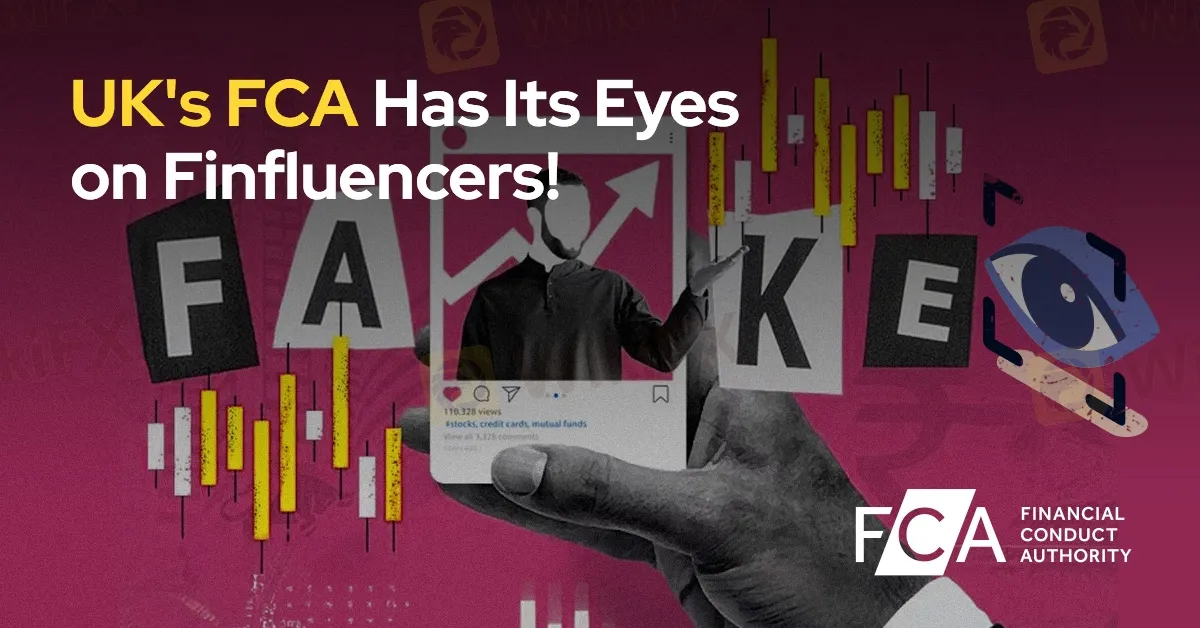简体中文
繁體中文
English
Pусский
日本語
ภาษาไทย
Tiếng Việt
Bahasa Indonesia
Español
हिन्दी
Filippiiniläinen
Français
Deutsch
Português
Türkçe
한국어
العربية
UK's FCA Has Its Eyes on Finfluencers!
Abstract:The Financial Conduct Authority (FCA) has intensified its scrutiny of social media influencers, commonly known as "finfluencers," amid concerns that many are promoting financial products illegally.

The Financial Conduct Authority (FCA) has intensified its scrutiny of social media influencers, commonly known as “finfluencers,” amid concerns that many are promoting financial products illegally. As part of its enforcement efforts, the FCA is currently interviewing 20 financial influencers under caution, signalling its commitment to tackling this issue. Additionally, the regulator has issued 38 alerts regarding social media accounts that may contain unlawful financial promotions.
This rise in regulatory action reflects growing apprehension among authorities globally. U.S. regulators, such as FINRA and the SEC, have raised similar concerns about the influence of social media on investor behaviour. Germany's financial regulator, BaFin, has also expressed alarm over the potential risks posed by the growing influence of finfluencers in the financial markets, especially given their reach among younger investors.
One of the most pressing concerns highlighted by the FCA and other regulators is the vulnerability of younger audiences to financial scams. Studies show that 62% of individuals aged 18 to 29 follow social media influencers, and a staggering 74% of these followers trust the advice they receive from these influencers. Even more concerning is that nine out of ten young followers have altered their financial behaviour based on this advice, potentially exposing themselves to significant risks.

Steve Smart, Joint Executive Director of Enforcement and Market Oversight at the FCA, emphasized the importance of finfluencers being fully aware of the products they promote. He noted that finfluencers often have the trust of their followers, particularly young and vulnerable individuals attracted to the lifestyle they portray. Smart stressed the need for influencers to ensure that their promotions do not break the law, as doing so could put their followers' financial security, and even life savings, at risk.
The growing trend of younger investors turning to social media for financial advice has been underscored by a recent BaFin study, which surveyed 1,000 investors. The study found that over half of Millennials and Gen Z investors consider social media a viable alternative to traditional financial guidance, particularly in areas like cryptocurrency investments. Furthermore, 43% of social media users have invested in cryptocurrencies, yet many remain unaware that finfluencers may be financially compensated for their recommendations.
Additional research by Barclays highlights the potential risks of relying on social media for financial advice. A survey of over 2,000 UK adults revealed that 51% of investors who use social media for financial guidance fail to verify the credibility of finfluencers. The survey also found that nearly a quarter of UK adults now turn to social media, messaging apps, and online forums for investment advice, with this trend being especially pronounced among Gen Z, 37% of whom rely on these channels for financial guidance.
As regulators worldwide increase their oversight of financial promotions, it is becoming clear that finfluencers must be fully aware of the legal implications associated with their content. James Alleyne, Legal Director in the Financial Services Regulatory team at Kingsley Napley LLP, pointed out that the FCA's regulatory perimeter is broad, and it is easy for influencers to fall within its jurisdiction, even unintentionally. He further emphasized that financial promotions are tightly regulated, and even well-meaning educational content can cross the line into regulated business, potentially leading to criminal investigations.

Disclaimer:
The views in this article only represent the author's personal views, and do not constitute investment advice on this platform. This platform does not guarantee the accuracy, completeness and timeliness of the information in the article, and will not be liable for any loss caused by the use of or reliance on the information in the article.
Read more

Forex Hedging: Is It a Trader’s Safety Net or Just an Illusion?
In the volatile world of forex trading, risk is inevitable. One widely used strategy is forex hedging, which is a useful technique designed not to eliminate risk entirely, but to reduce its potential impact. As global economic uncertainty persists, understanding how hedging works could be an essential addition to a trader’s toolkit.

Thinking of Investing? Read Must-Know Facts About Funding pips!
When you check the internet for Funding Pips, you'd be surprised to know it's filled with praise for Funding Pips but often lacks the real facts that traders need. Everything that seems too good to be true should always be verified first. It could be Fraud . So, we conducted research and collected several facts you must know about Funding Pips.

OctaFX Back in News: ED Attaches Assets Worth INR 134 Cr in Forex Scam Case
The Enforcement Directorate (ED) in Mumbai has attached assets worth around INR 131.45 crore. This included a luxury yacht and residential properties in Spain. Read this interesting story.

Truth About Angel One – Here’s What You Need to Know
Thinking about investing in Angel One? Wait! Know the essential things about the broker before Invest. It could be SCAM. Read, think, and invest .
WikiFX Broker
Latest News
He Thought He Earned RM4 Million, But It Was All a Scam
CryptoCurrency Regulations in India 2025 – Key Things You Should Know
OctaFX Back in News: ED Attaches Assets Worth INR 134 Cr in Forex Scam Case
Trump inaugural impersonators scammed donors out of crypto, feds say
Ethereum is powering Wall Street's future. The crypto scene at Cannes shows how far it's come
Forex Hedging: Is It a Trader’s Safety Net or Just an Illusion?
US debt is now $37trn – should we be worried?
OPEC+ members agree larger-than-expected oil production hike in August
Top Wall Street analysts are pounding the table on these 3 stocks
US Jobs Data Out: Boom in Government Sector, Not So in Private Sector
Currency Calculator


